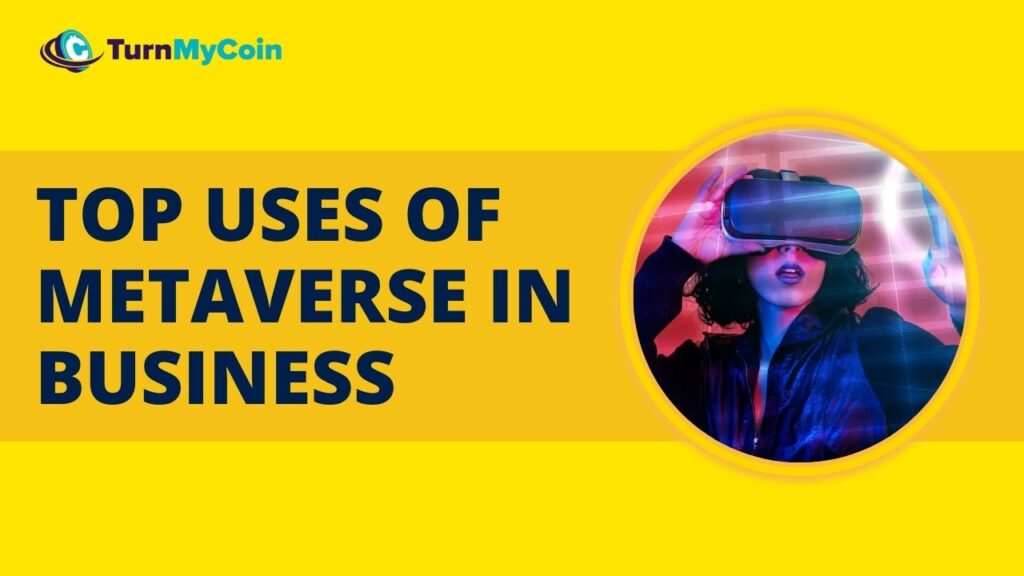Last updated on August 24th, 2024 at 08:02 am

Introduction
Metaverse is a blockchain-based technology that allows users to create, experience, and monetize virtual reality (VR) content and applications. It has the potential to revolutionize how businesses and organizations conduct their business. Like, in the areas of marketing, sales, education, and training.
Metaverse is a 3D virtual world that can be accessed through the corresponding Metaverse application. It’s a new way to communicate and interact with people around the world in real-time. It can bring a new level of engagement to their marketing efforts.
Metaverse has multiple uses in businesses to interact with their customers more effectively since Metaverse allows users to create their own avatars and environments.
It was bought to the public back in 1992. It was initially used as part of a mainstream online game. Some may even argue that this is not technology at all. While it does have several core components of a game. Metaverse already renders its fundamentals as a technological pillar.
Metaverse is on a mission to eliminate barriers that restrict people from experiencing augmented reality (AR) and virtual reality (VR) at their fullest. Here are some of the top uses of Metaverse in business.
- What is Metaverse Exactly?
- Uses of Metaverse in Business
- 1. Gaming Industry
- 2. Travel and Tourism Industry
- 3. Education and Learning Industry
- 4. Remote Working
- 5. Healthcare Industry
- 6. Social Media and Entertainment
- 7. Real Estate Industry
- 8. Manufacturing & Heavy Industries
- Metaverse benefits for businesses
What is Metaverse Exactly?
Metaverse is a virtual reality environment that combines the best of both worlds: the digital world and the real world. It’s built on blockchain technology and not no single entity controls it (decentralized).
Accordingly, everything that happens in Metaverse happens through smart contracts on the blockchain.
You can create your own avatar in Metaverse and use it to interact with others just like you would in Second Life or any other virtual reality world.
I am sure you have seen Jonny Quest animated cartoons. Most of the action used to happen in the Quest World there. And you can conveniently say that at present Metaverse is at its initial stages of the Quest World.
It is a virtual world where people can interact, play games, and shop. It will allow you to explore every corner of this digital space that looks like the real world.
The only difference is that it’s not restricted by time or location but by your imagination.
In order to understand more about Metaverse, you can check out this article.
Uses of Metaverse in Business
1. Gaming Industry

The Gaming Industry has multiple uses of Metaverse. It allows users to create their own virtual reality and play games in their own 3D environment. Gaming is a huge industry, and people have been playing video games for decades now. Metaverse adds a real-life experience to your games with Augmented Reality (AU).
For example, the metaverse could be used to simulate a game like Minecraft or Roblox. Where employees work together to build something out of blocks. Just like a skyscraper or castle—and then test their creations against other players’ creations. This could be used as a team-building exercise or as a fun way to reward employees for a job well done.
2. Travel and Tourism Industry

One of the most important industries in the world is travel and tourism. It’s also one of the most competitive few. The travel & tourism industry can be one of the most immersive uses of metaverse.
Metaverse can help you stand out from the crowd and make your business more efficient.
For example, imagine you’re a tour guide at a famous landmark like the Eiffel Tower in Paris. You could use Metaverse to create an augmented reality experience where visitors can walk around the tower in 3D. Even climb it if they have their own virtual reality headset.
Visitors could also have their photo taken with the iconic landmark as a backdrop. If you’re a hotel chain that offers tours. Metaverse could help you create an app that lets guests experience your city on their phones—and show them. What their room looks like before they even step foot inside.
3. Education and Learning Industry

The Metaverse’s potential for education and learning is as great as its other applications. With the ability of teachers to create interactive lessons, students will be able to interact with real-world objects in a virtual setting.
This could allow for a more immersive and engaging experience for students. Which would be especially useful for subjects like science and history.
Students have also multiple uses of Metaverse to create their own projects using 3D modeling software. They can then share these projects with other students or teachers who can offer feedback on how to improve them or suggest changes.
It can be used to connect teachers with students to enhance the classroom experience by providing more opportunities for collaboration. Students can practically live the experience while they study and literally not dose in the classes.

4. Remote Working

The global economy has shifted to a digital one, and many enterprises have become more digitalized. With this shift, there are new challenges faced by businesses such as:
- How to maintain productivity while keeping employees engaged and motivated;
- How to ensure security,
- How to maintain quality control, and
- How to keep up with competition while keeping costs down.
Instead of having all employees work from their own offices, companies can now replace this with a virtual office that allows employees to work remotely at any time, from anywhere in the world.
This approach has many advantages such as cost savings and employee satisfaction.
Employees will feel more satisfied working remotely because they will not be tied to an office desk or cubicle. Where they have no freedom to move around, get fresh air or take a break when needed.
Instead, they can work from home or wherever they feel comfortable. So long as there’s an Internet connection available – even on their mobile phones if necessary.
5. Healthcare Industry

One of the most promising uses of Metaverse is in the Healthcare industry. Not only does it allow the delivery of medical services at low costs, but it also helps in monitoring patients remotely and improving their outcomes.
Uses of Metaverse in the following health sub-fields:
1. Radiology
The technology can be used to scan patients remotely, which is both more convenient for patients and less expensive than traditional methods. This will help improve healthcare delivery worldwide and decrease wait times for patients.
2. Healthcare management
Healthcare providers can utilize Metaverse to collect patient data in one location. It makes it easier to analyze and track trends over time. This will help improve care quality.
3. Medical records
Patient records can be stored in the blockchain without fear of being lost or tampered with.
It is very safe as only your doctors can have access to your records and that too at your will as it uses Blockchain Technology.
This will also streamline processes such as insurance claims processing and ensure that all parties involved are kept honest.
6. Social Media and Entertainment

The Metaverse platform is being used by many companies to create their own branded environments, where they can interact with their customers and partners. This type of environment allows companies to be more creative, while also providing an engaging experience for their users.
Many businesses are already using the Metaverse platform to create a unique and interactive experience for their customers.
The most common use case is the creation of virtual avatars to represent company employees or brand ambassadors. These avatars can then be used on social media platforms such as Facebook or Instagram to interact with customers in real-time.
Metaverse is being used by many companies to create immersive experiences for their customers.
This technology has also been used as a way to share information about products or services with customers without having them leave their homes.

7. Real Estate Industry

One of the top uses of Metaverse in business is real estate. Metaverse allows developers to create an immersive experience for clients, allowing them to immerse themselves in a virtual property before they even step foot in it.
This allows potential buyers to see exactly what they would be buying, which makes it easier to sell properties quickly and effectively.
In addition, it also helps developers sell more than one property at a time by providing them with an interactive way for clients to view multiple properties at once.
For example, if a developer has ten properties on their website and wants to show each one off in detail, they can do this easily by displaying each room separately as well as giving them options like zooming in or out so that they can see anything they want without having to move around too much.
8. Manufacturing & Heavy Industries

A metaverse is a great tool for heavy industries and manufacturing industries. These industries can design, construct and operate a virtual factory.
Industries would be able to see their whole production pipeline from beginning to end and make changes in real-time. This would allow them to maximize efficiency and prevent costly mistakes due to human error or delays.
Metaverse allows companies to create virtual factories that can be used as training facilities for employees or even customers. A company could send their employees through a virtual factory before they actually start working with real machinery so they can become familiar with it before they begin operating the equipment themselves.
This will save their money spent on expensive hardware or software licenses.
Another use of Metaverse within heavy industries is for companies who want to improve their operations through data analytics.
The Metaverse platform has already been adopted by some of the world’s biggest heavy industry players such as GE, Siemens, BASF, Airbus, BMW, and Ford Motors.
In addition, the platform was also used by companies like DHL, Audi and VW Group; all of which are using Metaverse for product visualization purposes only (not for orders).

Metaverse benefits for businesses
The Metaverse is a new world of endless possibilities. Let’s take a look at some of the Metaverse benefits for businesses including;
1. Engaged users
The Metaverse makes it easy to engage your users with immersive experiences that engage them in ways that you can only dream about on other platforms.
The Metaverse system allows users to create content and interact with each other through digital avatars. This means that your business will be able to reach out to customers in a more personal way than ever before and engage with them in real-time.
2. Virtual event opportunities
Virtual events are becoming increasingly popular as they allow you to connect with customers on an even deeper level than just email or phone calls.
With the Metaverse you can create an event that will bring people together from around the world without ever having to leave your home.
3. Sell and showcase products
The Metaverse makes it easy for customers to interact with products in ways they never could before.
4. Innovative Advertising
It creates a unique opportunity for advertisers to get creative with their ad campaigns by making use of Augmented Reality technology.
5. Easy transactions
It can offer businesses a safe and secure way of conducting financial transactions with their customers through the use of Cryptocurrencies like Bitcoin (BTC).
Conclusion
Outside of VR, Metaverse is an intriguing AR platform. When placed in front of an ordinary camera, it can be used to generate computer graphics on any surface at any location in 3D. This will make it a powerful tool for both artists and businesses alike.
The artistic possibilities of Metaverse are truly endless—and the applications outside of this realm are already being tested out by established companies such as Walmart. With that said, there’s no reason why small businesses shouldn’t give it a shot as well.
Fortunately, Metaverse is still in its infancy. Consequently, it doesn’t have large competitors or entrenched monopolies to contend with, allowing it to grow because of the demand for its technology rather than the supply of the same.
This gives founders and startups more opportunities to experiment with and incorporate Metaverse into their ideas and offerings.
Ultimately, as Metaverse and other cryptocurrencies gain more exposure and acceptance from both users and investors alike, we will likely see this industry continue to flourish and expand.


